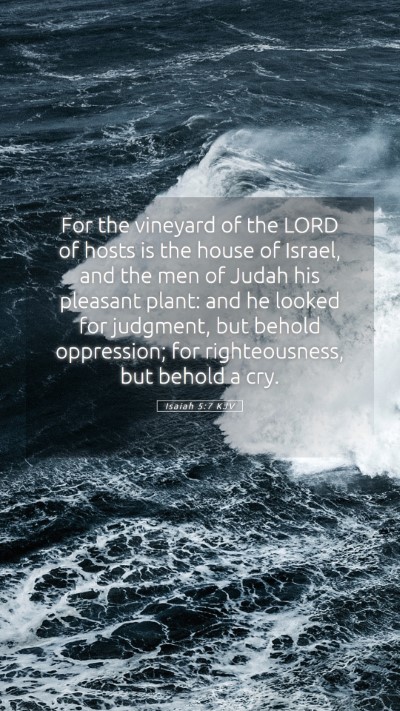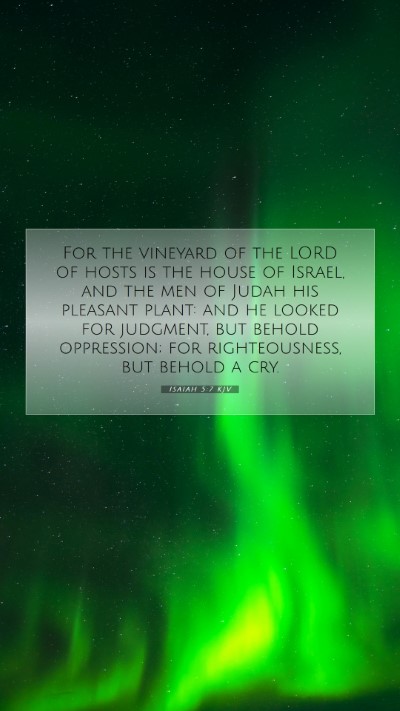Understanding Isaiah 5:7: A Deep Dive into Biblical Meaning
Isaiah 5:7 states: "For the vineyard of the LORD of hosts is the house of Israel, and the men of Judah his pleasant plant: and he looked for judgment, but behold oppression; for righteousness, but behold a cry." This verse serves as a poignant reflection of God's disappointment with His people. The imagery of a vineyard symbolizes Israel, highlighting God's care and expectation for His chosen people.
Overview of Biblical Exegesis
To grasp the meaning of Isaiah 5:7, we can draw from various public domain commentaries that shed light on the text's significance. Here is a synthesized interpretation based on insights from renowned commentators such as Matthew Henry, Albert Barnes, and Adam Clarke.
Analysis of the Vineyard Metaphor
The vineyard is a prevalent symbol in Scripture, representing God's people and their spiritual state. Matthew Henry articulates that the vineyard represents the "house of Israel" and signifies God’s investment in His people. He looked forward to them producing good fruits—justice, righteousness, and faithfulness—but found only oppression and injustice instead.
God’s Expectation vs. Reality
Albert Barnes emphasizes the expectation of judgment (justice) and righteousness from Israel, but sadly, the reality was different. Instead of producing the expected fruit, Israel's actions led to oppression and cries for help, indicating a severe moral decline among its inhabitants. The mention of "judgment" points not only to God's desire for legal justice but also a broader call to ethical behavior and integrity in society.
The Role of Judah
Adam Clarke highlights the importance of Judah as a "pleasant plant." This description underlines the special relationship between God and Judah, which was marked by divine favor. However, this privilege came with the responsibility to uphold justice and righteousness—values that God expected them to embody and promote.
The Call to Reflection
This verse serves as a profound call to reflection for both the ancient Israelites and modern readers. It encourages an examination of one’s behavior and societal conditions that don't align with divine expectations. It serves as a stark reminder that privilege carries responsibility, and failure to uphold it can lead to severe repercussions.
Key Themes and Applications
- Divine Displeasure: God’s longing for justice illustrates His displeasure when His standards are not upheld.
- Social Justice: The emphasis on righteousness speaks to the broader social justice implications inherent in God’s Law.
- Spiritual Responsibility: The concept teaches that being chosen or favored by God comes with the responsibility to act righteously.
- Reflecting on Today’s World: This passage prompts contemporary believers to assess societal injustices and their role in promoting righteousness.
Bible Study Insights and Applications
Those engaging in Bible study groups, or those utilizing online Bible study tools, can benefit from this passage by exploring its implications for today's society. Analyzing how scripture addresses themes of justice, oppression, and moral duty can foster deeper discussions and insights.
Cross References for Deeper Study
- Jeremiah 2:21: God compares Israel to a vine in the wilderness, emphasizing the failure to produce good fruits.
- Matthew 21:33-41: The parable of the wicked tenants reflects similar themes of neglecting the duties expected by the owner of the vineyard.
- Micah 6:8: A poignant reminder of what the Lord requires: doing justice, loving kindness, and walking humbly with God.
Conclusion
In summary, Isaiah 5:7 serves as a powerful reminder of God’s expectations from His people. Through the lens of the vineyard metaphor, it becomes evident that the expectation of justice and righteousness is fundamental to the relationship between God and His people. This insight invites readers to engage in personal and communal reflection on how they manifest these values in their lives. By applying the lessons from this verse, believers can align themselves closer to God's desires and work towards a society that reflects His righteousness.
For those seeking deeper Bible verse explanations or insights on how to interpret Bible verses, exploring passages like Isaiah 5:7 can provide valuable lessons in living a life that honors the intentions of Scripture.


